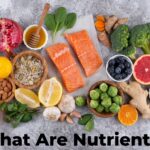The Essential Guide to Nutrients and Health, If you’ve ever taken supplements to address a health concern or added a scoop of protein powder to your post-workout smoothie to boost your gains, you have the nutritionists who work on nutritional science to thank.
If you’re interested in learning about nutritional science, you’ve come to the right place. This complete guide to nutritional science will provide a thorough understanding of the principles and evolutionary history of nutrition, the roles of micronutrients and macronutrients, and how nutrition science impacts both physical and mental health. So let’s go.

What Is Nutrition Science?
Nutritional science, also known as nutritional science, and nutrition for short, is the science that studies how food affects our body, health, and overall well-being (basically the human body and overall health). It is the study of different nutrients in food, how the body uses them, and the relationship between a balanced diet, health, and disease.
Nutrition science also focuses on how people choose their diet plans to prevent various diseases. What happens if a person consumes too much or too little of a nutrient?
Nutritional science is also combined with food science. The term “trophology” is also used globally in other languages for nutritional science.
The evolution of nutritional science has been a long journey and has seen significant progress over the past few centuries. Chemists and nutritionists have worked on the role of food and nutrients in the 19th century, especially macronutrients, which include carbohydrates, proteins, and fats.
In the early years of the 20th century, chemists discovered vitamins and minerals and their importance to overall health, and coined the term “vitamin” in 1912. The first vitamin (B1) was chemically described in 1926 as thiamine.
What is Nutrition Therapy?
Nutrition therapy or nutritional therapy is a nutritionally-based treatment approach that uses personalized diets and dietary interventions to treat or manage specific health conditions. These include conditions such as diabetes, heart disease, kidney disease, and digestive disorders that are managed through nutritional therapy.
Nutrition therapy aims to promote health by providing the body with essential nutrients to function properly and support healing, in combination with medications and other treatments.
How Does Nutrition Affect Your Overall Health?
Nutrition is about eating a healthy, balanced diet on a regular basis. Nutrition is essential for maintaining good health because it provides the body with nutrients.
Optimal nutrition helps provide the body with energy and improves the health of the baby, mother and child, the immune system, and a safe pregnancy and childbirth. It also plays a role in reducing the risk of non-communicable diseases such as diabetes and cardiovascular disease, reproduction, longevity, and overall health.
What Are Nutrients?
Nutrients are substances that the body cannot produce in sufficient quantities, so they must be obtained through a healthy balanced diet. There are 6 essential nutrients, each playing a specific unique role in body function and overall health, and are divided into two categories.
- Macronutrients are nutrients that your body needs in large amounts. Carbohydrates, protein, fat, and water are macronutrients.
- Micronutrients are nutrients that are needed in small amounts. Micronutrients are vitamins and minerals.
What Are the Principles of Optimal nutrition?
The best diet consists of fresh fruits, vegetables, whole grains, and few processed foods. But I recommend that you seek expert advice before starting any diet plan or making any changes to your diet plan. The following are 3 basic principles of the best diet:

- Balance: Consuming adequate amounts of nutrients through a healthy diet is essential for improving body function and overall health.
- Quality: Focus on healthy, nutritious foods, such as fruits, vegetables, whole grains, and lean proteins. Avoid processed foods that are high in sugar and unhealthy fats.
- Timing:It is very important when you eat a diet as you eat. Properly timed meals can improve energy levels and nutrient absorption for better performance and overall health.
Common myths of nutrition and the facts behind them
The following are common dietary myths and the facts behind them:
- Myth: Fat makes you fat. You should avoid fat to stay healthy.
- Fact: Not all fats are actually bad. Fats from avocados, nuts, and extra virgin olive oil, whole eggs, fatty fish, and full-fat yogurt are beneficial for overall health if you cut down on unhealthy fatty foods and exercise regularly.
- Myth: Carbohydrates are the enemies that cause weight gain.
- Fact: Not all carbohydrates are bad. Complex carbohydrates (a type of carbohydrate) are a healthy choice for your body. Complex carbohydrates can be found in whole grains and vegetables.
- Myth: Egg yolks are unhealthy and high in fat.
- Fact: People believe that eating egg yolks is unhealthy and contains a large amount of fat that increases blood cholesterol levels. Studies show that eating egg yolks has minimal impact on people’s blood cholesterol and egg yolks also contain essential nutrients like vitamins and healthy fats.
- Myth: Eating late at night causes weight gain.
- Fact: It is not important when you eat but how many calories you eat. The total daily calorie intake is more important so you should calculate the calorie intake.
Conclusion:
Finally, we will review what we have explained in this article, that the science of nutrition plays a very important role in understanding the study of how food affects our overall health. It examines the effects of various nutrients on overall body function, disease prevention, and maintaining a balanced diet.
Nutrition science provides the foundation for a healthy lifestyle, from macronutrients such as carbohydrates, protein, fat and water to micronutrients such as vitamins and minerals. By following the fundamental principles of optimal nutrition, namely balance, quality and timing, it allows individuals to make informed dietary choices that support physical and mental health for a long and healthy life, while dispelling common myths about nutrition and the facts behind them.
If you need clarification, feel free to go back and read again to learn these important concepts.
Frequently Asked Questions (FAQs):
Q1: How to start healthy eating habits?
Ans: The best way to start eating a healthy diet is to make gradual changes to your diet. Focus on eating more fruits, vegetables, whole grains, and lean proteins while cutting back on processed foods. Stay hydrated, avoid sugar and unhealthy fats, and balance your plate with protein, fiber, and healthy carbohydrates. Start small, set realistic goals, and track your meals to stay on track.
Q2: How do make sure you are getting enough nutrients?
Ans: To make sure you’re getting all the essential nutrients you need, such as vitamins, minerals, healthy fats, healthy carbohydrates, lean protein, and water, eat a variety of healthy foods, such as fruits, vegetables, whole grains, fatty fish, nuts, and legumes. Focus on nutrient-dense foods and aim to balance your meals. Avoid taking supplements unless recommended by experts.
Q3: Why is diet more important than exercise?
Ans: Diet and exercise both play an important role in maintaining fitness and weight loss. Diet is considered more important than exercise because diet directly affects calorie intake. Along with this, exercise plays an important role in burning calories.

